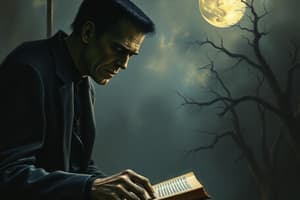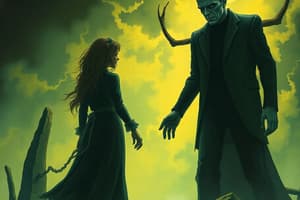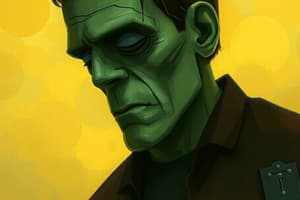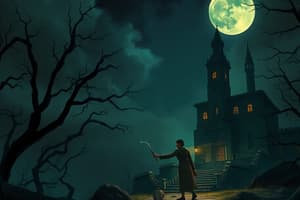Podcast
Questions and Answers
What type of fiction is Frankenstein
What type of fiction is Frankenstein
Gothic Fiction, Science Fiction
What is a central theme explored in Frankenstein
What is a central theme explored in Frankenstein
ambition
What type of writing is The Things They Carried?
What type of writing is The Things They Carried?
Realistic Fiction
What is the primary focus of The Things They Carried?
What is the primary focus of The Things They Carried?
What is the primary conflict in Frankenstein
What is the primary conflict in Frankenstein
How does The Things They Carried portray guilt?
How does The Things They Carried portray guilt?
Which statement best describes how The Things They Carried portrays the soldiers' experiences?
Which statement best describes how The Things They Carried portrays the soldiers' experiences?
Which statement correctly describes how Victor's guilt is manifested in Frankenstein
Which statement correctly describes how Victor's guilt is manifested in Frankenstein
What literary device does Shelley use to emphasize Victor's emotional isolation and self-recrimination in Frankenstein
What literary device does Shelley use to emphasize Victor's emotional isolation and self-recrimination in Frankenstein
What type of imagery does Shelley use to underscore Victor's guilt and isolation in Frankenstein
What type of imagery does Shelley use to underscore Victor's guilt and isolation in Frankenstein
What literary technique does O'Brien utilize to portray the soldiers' fragmented emotional states in The Things They Carried
What literary technique does O'Brien utilize to portray the soldiers' fragmented emotional states in The Things They Carried
How does O'Brien use realism to convey the soldiers' guilt in The Things They Carried
How does O'Brien use realism to convey the soldiers' guilt in The Things They Carried
What statement best captures the contrast between Victor's guilt and the soldiers' guilt in Frankenstein and The Things They Carried
What statement best captures the contrast between Victor's guilt and the soldiers' guilt in Frankenstein and The Things They Carried
How does Victor's isolation in Frankenstein contribute to his struggles?
How does Victor's isolation in Frankenstein contribute to his struggles?
How is isolation portrayed in The Things They Carried
How is isolation portrayed in The Things They Carried
Which statement accurately contrasts the portrayal of isolation in Frankenstein and The Things They Carried
Which statement accurately contrasts the portrayal of isolation in Frankenstein and The Things They Carried
What does the monster in Frankenstein desire that illustrates the human need for connection?
What does the monster in Frankenstein desire that illustrates the human need for connection?
What is the main purpose of the soldiers sharing stories in The Things They Carried?
What is the main purpose of the soldiers sharing stories in The Things They Carried?
What is the ultimate outcome of the monster's quest for connection in Frankenstein
What is the ultimate outcome of the monster's quest for connection in Frankenstein
What is the significance of the soldiers' shared experiences in The Things They Carried?
What is the significance of the soldiers' shared experiences in The Things They Carried?
Which of the following statements accurately reflects the overall message conveyed by both Frankenstein and The Things They Carried
Which of the following statements accurately reflects the overall message conveyed by both Frankenstein and The Things They Carried
What literary techniques does Shelley primarily use in Frankenstein
What literary techniques does Shelley primarily use in Frankenstein
What literary techniques does O'Brien primarily use in The Things They Carried
What literary techniques does O'Brien primarily use in The Things They Carried
What is the key difference between the portrayal of isolation in Frankenstein and The Things They Carried
What is the key difference between the portrayal of isolation in Frankenstein and The Things They Carried
Flashcards
Frankenstein's Guilt
Frankenstein's Guilt
Victor Frankenstein's feeling of responsibility and horror after creating the monster.
Gothic Imagery
Gothic Imagery
Dark and dramatic descriptions, often used to convey intense emotion.
Victor's Isolation
Victor's Isolation
Victor's separation from others due to his obsession with science.
The Monster's Alienation
The Monster's Alienation
Signup and view all the flashcards
Theme of Guilt (Frankenstein)
Theme of Guilt (Frankenstein)
Signup and view all the flashcards
Theme of Isolation (Frankenstein)
Theme of Isolation (Frankenstein)
Signup and view all the flashcards
The Things They Carried (TTTC)
The Things They Carried (TTTC)
Signup and view all the flashcards
Shared Trauma (TTTC)
Shared Trauma (TTTC)
Signup and view all the flashcards
Emotional Burdens (TTTC)
Emotional Burdens (TTTC)
Signup and view all the flashcards
Realism (TTTC)
Realism (TTTC)
Signup and view all the flashcards
Fragmented Structure (TTTC)
Fragmented Structure (TTTC)
Signup and view all the flashcards
Collective Guilt (TTTC)
Collective Guilt (TTTC)
Signup and view all the flashcards
Personal Guilt (Frankenstein)
Personal Guilt (Frankenstein)
Signup and view all the flashcards
Shared Guilt (TTTC)
Shared Guilt (TTTC)
Signup and view all the flashcards
Responsibility (Frankenstein)
Responsibility (Frankenstein)
Signup and view all the flashcards
Responsibility (TTTC)
Responsibility (TTTC)
Signup and view all the flashcards
Societal Alienation
Societal Alienation
Signup and view all the flashcards
Gothic Fiction
Gothic Fiction
Signup and view all the flashcards
Science Fiction
Science Fiction
Signup and view all the flashcards
Realistic Fiction
Realistic Fiction
Signup and view all the flashcards
First-person Narrative
First-person Narrative
Signup and view all the flashcards
Episodic Storytelling
Episodic Storytelling
Signup and view all the flashcards
Non-Linear Narrative
Non-Linear Narrative
Signup and view all the flashcards
Psychological Realism
Psychological Realism
Signup and view all the flashcards
Hubris
Hubris
Signup and view all the flashcards
Study Notes
Frankenstein
- Published in 1912, a Gothic/Science Fiction novel
- Victor Frankenstein creates a living creature, abandons it, leading to tragic events
- Explores ambition, responsibility, societal alienation
- Victor experiences guilt and horror after creating the creature
- The creature is described as "wretched" and "miserable"
- Victor's isolation and self-recrimination are emphasized
- Victor's guilt is linked to his ambition, and unchecked desire
- The novel critiques the dangers of hubris and moral consequences of playing God
The Things They Carried
- Published in 1990, a collection of interconnected Vietnam War stories
- Presents physical and emotional burdens of war
- Explores themes of memory, trauma, and the blurred line between truth and fiction
- A realistic fiction, examining the impact of war
- Jimmy Cross feels responsible for Ted Lavender's death
- Soldiers carry emotional burdens, exemplified by their physical carryings
- Non-linear narratives emphasize fragmented emotional states of the soldiers
- Soldiers' guilt is communal and fragmented
- Experiences of war are shared, yet isolating
- Isolation is a shared experience among soldiers.
Comparison: Frankenstein and The Things They Carried
- Both explore guilt as a powerful force impacting characters
- Both explore themes of isolation
- Frankenstein uses gothic imagery for a deeply personal portrayal of guilt and isolation
- The Things They Carried uses realism and a fragmented narrative, showing a more communal and psychological portrait of shared trauma
Isolation and Alienation
- Frankenstein: Victor isolates himself during scientific work, alienated from nature and society
- The Things They Carried: Soldiers feel alienated from civilians, due to their war experiences. Their trauma creates a barrier between them and the outside world
- O'Brien's style emphasises shared isolation through storytelling
- Shelley critiques the dangers of isolation, showing how disconnecting from humanity leads to destruction
The Human Need for Understanding and Connection
- Frankenstein: The monster's desire for companionship shows the importance of connections
- The Things They Carried: Soldiers use storytelling to objectify their experiences and connect with each other
- Both texts explore the importance of connection, and how its absence leads to suffering
- Sharing experiences, like stories, reduces distance and builds empathy.
Studying That Suits You
Use AI to generate personalized quizzes and flashcards to suit your learning preferences.




